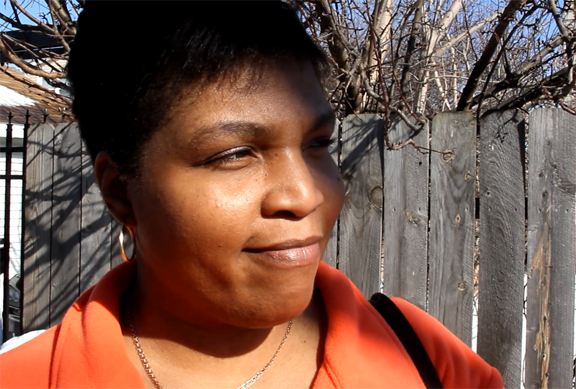WBEZ listener Ken Coulman has been having dirty thoughts, specifically regarding the garbage in his alleyway. He’s seen all kinds of dumping habits, from random contractors offloading items behind his house to neighbors sneakily leaving oversized items in alleyways not their own. In their stealthy haste, they make a mess.
As a homeowner in Chicago’s Humboldt Park neighborhood, these behaviors troubled Ken. Recently, when he spotted a stack of old tires piled by the garbage, he called Curious City with this question:
What’s the city’s official policy on garbage pick up? Do they take anything that you put out?
While taking on Ken’s question, we learned that a pretty straightforward pickup policy provides some city workers with a unique — and sometimes unflattering — view of life in Chicago.
Size doesn’t matter
For our answer, we turned to Gloria Pittman, a supervisor at Chicago’s Bureau of Sanitation, which serves 600,000 households in Chicago. These households are limited to single-family homes or buildings with four units or less. Pittman oversees garbage collection for seven wards from Pilsen to Jackson Park. She’s previously worked on the front lines as a garbage collector herself.

“We will pick up almost anything,” Pittman said. “It is our objective to pick up everything that’s in front of the truck, be it trash, sofas, on occasion electronics such as refrigerators, stoves.”
In other words, size doesn’t matter. There’s no size limit to what residents are allowed to throw out, as long as it’s regular household garbage.
The department accommodates big items with what’s called “a special pick up.” That’s simply a heads-up to garbage collectors to carve out more time. While picking up a few regular canisters outside one house takes about 30 seconds, disposing of something more sizable, like a sectional couch, may take a few minutes. That heads-up can help make the process more efficient.
Pittman said collectors are usually notified by supervisors who monitor the alleys. But preferably, the notification originates from residents who call Chicago’s 311 service line. Pittman says you can request additional garbage bins online, if need be.
“Notification from the resident really helps us out a great deal,” said Pittman.
Chicagoans in the tattling mood can also help by reporting persistent sanitation code violations.
Down in the dumps … at a special collection
To see how a regular pick-up differs from a special pick-up, we ventured into the back alleys in Chicago's Gage Park neighborhood on the Southwest Side.
A blue sanitation truck rolled through a snow-covered alley. Two workers hooked trash bins onto something called “the flip,” which, as its name implies, flips bins upside down into the truck. A heavy blade crushed and scooped the trash into the inner chamber.
Hook. Flip. Crush. Repeat.
The workers had a nice rhythm — until they ran across what looked like the remnants of an extreme home makeover. Pittman was on site and surveyed the heap of furniture.
“This is a loveseat, a desk, parts of a table, an end table, a couple mattresses, some chairs and an ottoman,” she said, laughing.
The garbage collectors declined an interview. “It’s kind of dangerous when I talk and work,” said one as he reached for a piece of furniture.
And he was right. There was heavy lifting to do. A crushing blade tore through wood and nails. Sharp debris spit out the back. I watched a mattress flop into the back of the truck. It splintered into pieces.
“And as you see, the blade is breaking that up and taking it on in,” Pittman observed. “It basically makes room as it goes along.”
Eight minutes later, it’s all been gobbled up.
“As you can see, everything is gone. Hopefully the residents are happy,” said Pittman.
Some limits do apply
Even though there’s no size limit, Pittman noted that there are other kinds of limits. Most Chicago residents think, “If it’s garbage to you, it should be garbage to us,” but that’s simply not the case, she said.
For example, say you rehab a room by yourself. You can throw the debris in the garbage. It’s no problem, at least when it comes to city policy. But if a contractor does it for you, that contractor is required to take away the refuse. But not all residents abide by that rule; Pittman has seen plenty of instances where an entire gut renovation has been dumped in an alley. In those cases, the department has a conversation with the resident.
“We try not to fine,” said Pittman, noting that the department focuses on communicating expectations with residents. “We want compliance.”
It’s also a hassle when residents don’t bag their trash properly. “When they have to clean up things that people have just thrown out willy nilly — that kind of breaks up their rhythm,” she said.
Another problem is fly dumping. “That’s where a large truck or car has dumped a large amount of garbage — usually in desolate areas,” explained Pittman.
The Bureau of Sanitation will not collect hazardous materials and certain electronics such as computers and cell phones. Residents can dispose of these items, such as household cleaners and oil-based paints, at the city’s Household Chemicals and Computer Recycling Facility. The city provides information about that facility and what it accepts.
The worst thing Pittman’s ever run across? Dead animals and human waste. Pittman said residents with dead pets should call 311; a refrigerated truck will do the pick up. And as for human waste, well, come on now.
Pittman let us in on one of the classic jokes among garbage collectors. “You can find out a lot about people with the trash that they throw out.”
A reason for hope
I followed up with our question-asker, Ken Coulman, to get his reaction to all of this. The dead animal and human waste details certainly grossed him out.
“Eeh … that’s not cool,” he said.

“That’s not at all what I was expecting to find out,” he said after a long pause.
He was also relieved.
“That’s very interesting because I’ve always kind of felt like you’re probably doing something illegal by putting those big items out there,” he said. “I think it’s helpful to know that you don’t need to be sneaky about it. You can call 311 and give them a heads up and be civil about it.”
To Ken, this is good news. He hopes that now that people know they don’t have to be sneaky, they’ll stop being so sloppy.
Here’s hoping, Ken.
Deborah Jian Lee is a freelance journalist and author. Follow her @deborahjianlee.




